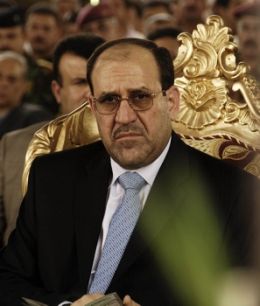Iraq’s Prime Minister Nouri al-Maliki wrote recently in the New York Times, “In spite of the terrorist threats we face, we are not asking for American boots on the ground. Rather, we urgently want to equip our own forces with the weapons they need to fight terrorism, including helicopters and other military aircraft so that we can secure our borders and protect our people.” Al-Maliki’s appeal for US help certainly vindicates those who think US involvement in Iraq is vital, but more importantly, it shows that US security assistance provides an alternative to forward stationing of US troops.
With its robust defense sector and advising experience, the United States has a long history of helping friendly governments combat their internal threats (Colombia, the Philippines, and Thailand) and prepare for external threats (Saudi Arabia, Japan, and Georgia). By training and equipping other militaries, the goal is to reduce American military presence internationally and allow others to provide for their own security. For example, with every Joint Strike Fighter Japan deploys, there is one less that the United States needs to buy and field in Asia. By developing the Afghan military and police, NATO operations were able to shift from combat to advising. And when Saudi Arabia counters the Iranian missile threat through US defense imports, the United States can reduce its presence in the Middle East.
Efforts like these show security assistance has positive benefits not only for the declining US defense budget, but also for international security marred by states at risk (e.g., Mexico, Philippines, and Nigeria), developed countries with security dilemmas (e.g., Japan, South Korea, and Singapore), and developed countries that lack the military capabilities to implement their own foreign policies (e.g., France in Mali or the United Kingdom in Libya). As the United States reduces its force structure and forward presence over the next five years, partners must fill in the gap to prevent subnational and transnational challengers from creating regional instability.
Building partners’ capacity through security assistance may also be the way to resolve a tension in foreign policy noted by Henry Kissinger who wrote in 1994, “For the first time, the United States can neither withdraw from the world nor dominate it.” Twenty years later, facing significant budget cuts, the US faces the same dilemma. How can it find the right balance to preserve the current integrity of the international system?
To do so, the United States must shift its thinking from global leader to one of partner of choice, which means enabling others to combat areas of common concern such as terrorism, nuclear proliferation, and transnational organized crime. There is risk in this indirect approach, but recent experiences in Iraq and Afghanistan illustrate increased US attention does not necessarily equate to increased stability. Further, when these sobering experiences are combined with fiscal realities, it becomes clear that the status quo is not sustainable.
This change has immediate implications for international security and the future directions of US foreign policy aptly captured by Ambassador Donald Steinberg, the deputy administrator at USAID. As he said, “Countries that are prosperous, well governed, and respectful of human rights tend to not traffic in drugs, weapons, or people. They don’t transmit pandemic disease or spew out large numbers of refugees across borders and oceans. They don’t harbor terrorists or pirates. And they don’t require American ground forces.”
To do this, the security assistance bureaucracy must be revitalized to reduce the time it takes to transfer weapons and develop programs. The system must be more responsive when new states such as Kosovo and South Sudan are recognized or when new challengers to international security emerge. Partners often need assistance in the short term, but legal restrictions and annual budget cycles limit efforts to respond quickly to partners’ needs. Finally, the United States needs to depoliticize international security. We learned this the hard way in the 1990s when assistance was suspended for Pakistan and Indonesia and those countries looked elsewhere. And we can see this today through long-term allies like Turkey that can look elsewhere to satisfy their security needs.
Derek S. Reveron, PhD, is a professor of National Security Affairs and the EMC Informationist Chair at the US Naval War College in Newport, Rhode Island. The views here are his own and do not necessarily reflect US government policy.
